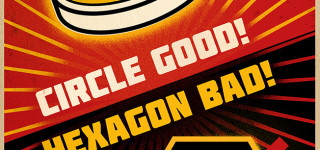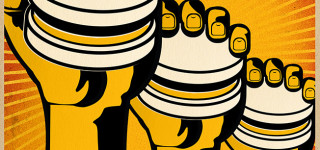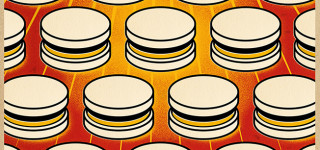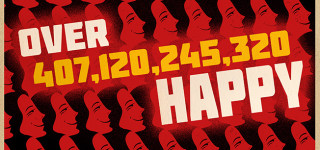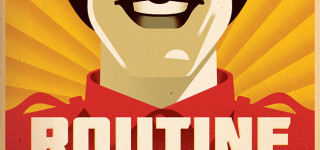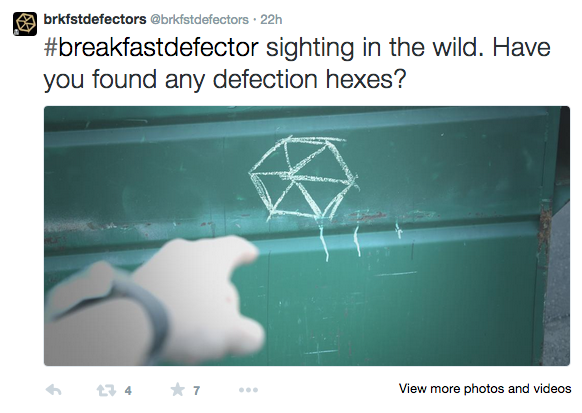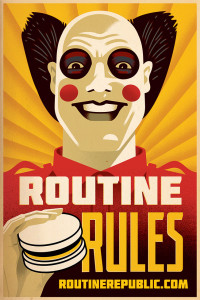 On March 23, 2015, Taco Bell launched an elaborate ad campaign that has been featured by Advertising World.
On March 23, 2015, Taco Bell launched an elaborate ad campaign that has been featured by Advertising World.
The campaign uses creepy clown propaganda and imagery similar to something from 20th century political ads used by communist, socialist, or fascist regimes.
Some of the color schemes and designs are reminiscent of Maoist political posters, and other aspects of the campaign convey an old world Russian communist theme. For example, some of the material has the letter R reversed as it would be in the Russian alphabet.
The campaign video (below) introduces two new websites launched by Taco Bell as part of the campaign.
RoutineRepublic.com is a creepy cult-like government propaganda site promoting a breakfast sandwich similar to the McMuffin. The use of a McMuffin sandwich image with a clown like figure is unmistakably a parody or satire of McDonalds being portrayed as a controlling monolithic organization or agency brainwashing people into eating their food.
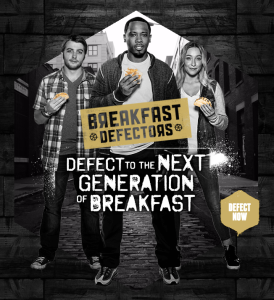 The BreakfastDefectors.com website is filled with time-released ‘missions’ and a social media toolkit for young people to voluntarily launch a media revolution against McDonalds.
The BreakfastDefectors.com website is filled with time-released ‘missions’ and a social media toolkit for young people to voluntarily launch a media revolution against McDonalds.
In this way, Taco Bell hopes to crowd-source a massive grass-roots social media promotion.
Those who join ‘in the struggle’ are encouraged to tweet using #breakfastdefectors and #promo as hashtags. Participants are awarded with prizes.
Campaign Launch Video
Here’s the ad campaign launch video…
Defector Care Packages
Taco Bell is apparently sending out care packages to registered defectors. Below is a video from one woman unboxing her defector kit on 26 March 2015.
Ad Campaign Resources
- Campaign Launch Video on YouTube
- BreakfastDefectors.com [Missions]
- RoutineRepublic.com
- Twitter.com/brkfstdefectors
Ad Campaign Propaganda
Below are images from the campaign.
Campaign Supporters
The campaign launch video (above) is a work of art and will appeal to advertising enthusiasts, those who study cinematic arts, students of social/cultural trends, pranksters, culture hackers, culture jammers, adbuster devotees, and those interested in criticizing or poking fun at McDonalds. That’s a fairly large pool of participants.
McDonald’s Critics. There’s been criticism from the alternative health sector and consumer advocacy groups about McDonald’s targeting of young people through the use of a clown as a mascot and putting playgrounds inside of their restaurants. Such critics see McDonalds as an agent peddling high sugar, high carb, high fat, and high sodium products to people at a young age when they are most impressionable and likely to become addicted to unhealthy food choices. The Taco Bell campaign video shows images of the McDonalds twisting playground slide descending from a guard tower. A mote made of fun pit balls is also shown in the video (similar to the play pits at McDonalds playgrounds). These images remind us of the strategic targeting of young people by McDonalds.
Police State Critics. There’s considerable momentum growing among those in the ‘free world’ who are dissatisfied with an increasing police state, the prison industrial complex, and an expanding surveillance-intrusive government. The Taco Bell campaign launch video has imagery that may bring these things to mind among activists. It seems to be critical of oppressive intolerant governments. Like the historic 1984 Apple commercial, it seems to warn of a possibly bleak future if trends don’t change. It’s a criticism of a world in which individualism, creative expression, and free speech are stifled.
Criticism
Some aspects of the campaign may be met with criticism. An attempt to subtly launch a crowd-sourced advertising campaign could be viewed as manipulating young people into working for free. The encouragement of graffiti (as conveyed in the tweet below) may also be frowned upon by some. Hopefully those who voluntarily participate in the campaign will respect private property and not engage in what could be perceived as vandalism by using water soluble paints/markers.
Several years ago, the Gaia Online community website encouraged ‘mischief makers’ to help bring their online world into public spaces. A spontaneous eruption of Gaia graffiti and home made ads began appearing everywhere on sidewalks, kiosks, buildings, cars, telephone poles, etc. Such campaigns are hard to control and could result in unpredictable outcomes.

